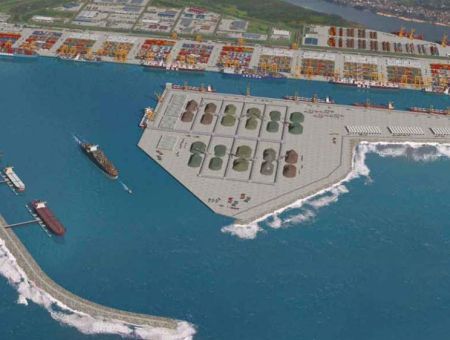
APM Terminals and its consortium partners have announced plans to develop a new greenfield mega-port project and Free Trade Zone at Badagry in Nigeria’s Lagos State, 55 km (34 miles) west of Apapa and the Port of Lagos on the Benin-Lagos Expressway.
At full build-out, the deep-water full-service port will be one of the largest in Africa with 7 km of quay and 1,000 hectares (2,470 acres) of dedicated yard, and will include state-of the art facilities for container, bulk, liquid bulk, Ro/Ro and general cargo as well as oil and gas operations support and a barge terminal. Plans for the adjoining Badagry Free Trade Zone will include a power plant, oil refinery, industrial park and warehousing and Inland Container Deport functions. The first phase of the project is scheduled to open in 2016.
“We are actively working with state and federal governments on the permission process” stated APM Terminals Africa-Middle East Regional CEO Peder Sondergaard, adding that “the Nigerian Ports Authority, Lagos State and the Nigerian federal Government have been supportive and positive”.
Earlier this year, Nigerian Minister of Transport, Senator Idris Umar, cited the proposed Badagry Port project as an example of a public-private partnership development which would help to address congestion and establish Nigeria as a maritime trading hub for West and Central Africa during his keynote address at the 12th Maritime Seminar for Judges in Abuja in June. The Benin-Lagos Expressway is currently being upgraded to a 10-lane highway which will facilitate cargo movements to and from inland destinations in the region.
APM Terminals is currently one of the largest port and terminal operators in Africa, and in West Africa in particular, where APM Terminals Global Terminal Network include nine facilities in eight West African nations, including Apapa Container Terminal, and West Africa Container Terminal in Onne, Nigeria. APM Terminals Apapa, which assumed operations at Lagos’ Apapa Container Terminal in 2006, is now the busiest container terminal in West Africa, handling 600,000 TEUs in 2011, with throughput for 2012 projected to be 720,000 TEUs. Equally important, shipping lines and African shippers have seen significant improvements to supply chain reliability and cost savings.
Industry analysts have predicted that Nigerian container volume, which totaled 1.4 million TEUs in 2011, will outstrip existing port capacity by 2017. At present, approximately 85% of all Nigerian non-oil cargo passes through the Port of Lagos. Over the next three decades, Nigerian annual container traffic is expected to grow to 10 million TEUs.
With 170 million people, Nigeria is the largest country in Africa by population, and the 7th-largest worldwide. By 2050, the UN has forecast that Nigeria’s population will have risen to 289 million, following only India, China, the USA and Pakistan in global population ranking. Lagos is the 2nd-largest city in Africa (after Cairo) with a population of 10.2 million, and is home to an estimated 60% of Nigerian manufacturing. The Nigerian economy, the 2nd-largest in sub-Saharan Africa after South Africa, driven by oil exports, has been forecast by the International Monetary Fund to expand by 7.1% in 2012 and 6.7% in 2013.
The proposed Badagry Mega-Port project fits well into APM Terminals’ strategy of infrastructure development in targeted high-growth markets. Current new terminal and port expansion projects and investments include Moin, Costa Rica; Callao, Peru; Santos, Brazil; Ningbo, China and Poti, Georgia. The Badagry consortium partnership is comprised of APM Terminals, Orlean Invest, the Macquarie Group, Oando PLC, the Chagoury Group and Terminal Investment Limited. Support for the project has also been expressed by the Nigerian Ports Authority, and the Governor of Lagos State.
We use cookies to improve your experience. By continuing to use our site, you accept our Cookies, Privacy Policy,Terms and Conditions. Close X